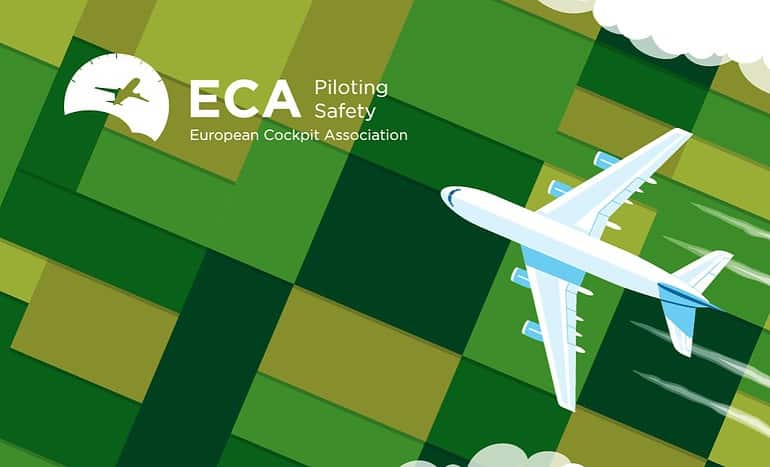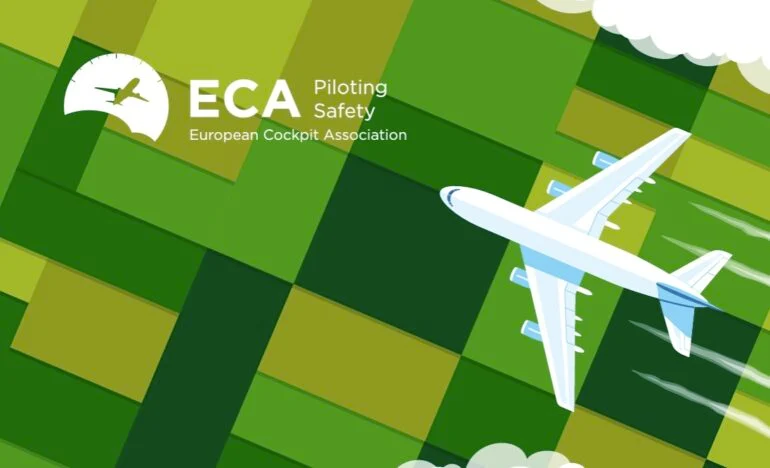
Climate change is one of the biggest challenges of our times. Aviation, as strategic European infrastructure, will continue to play a vital role with regards to ensuring safe mobility across the continent but it must significantly reduce its environmental footprint.
Sustainable Aviation Fuels (SAF) will be an essential enabler for this and deserves priority attention, while aviation’s green transition must also be a just transition, where environmental and social sustainability goes hand in hand.
“European pilots are fully committed to the Paris Agreement. European pilots support the goals of the European Green Deal and the ‘Fit for 55’ package.
They are willing to help build a greener, socially and economically robust future for aviation,” says ECA Vice-President Juan Carlos Lozano, referring to ECA’s newly presented Position Paper ‘Securing a Sustainable Future for Aviation”.
“We are ready to contribute concretely to the collective effort to reduce aviation’s environmental footprint. Our ambition is to collaborate with the industry and regulators in promoting new operational practices and procedures bringing further environmental gains while keeping safety as a priority,” declared Lozano.
ECA is hopeful that the ongoing EU legislative processes will deliver the right regulatory vehicles to set aviation on its decarbonization path.
As such ECA supports the so-called SAF allowances mechanism, which has gained traction in the European Parliament and also in the Council.
“However, additional policy initiatives are urgently needed if an EU blending mandate is not to remain wishful thinking at the end of the day,” commented Lozano.
“We urge all industry players, the Member States, and the European Commission to act in a truly public-private partnership spirit and to swiftly take concrete actions to boost the production and uptake of SAF by building up a strong industrial pillar in Europe,” he concluded.
’Building back better’ has become the new motto in the post-crisis era. It is the European pilots’ firm belief that aviation must seize this opportunity to ‘reinvent’ itself and become, again, a sustainable, robust, and resilient 3.0 industry – a pre-requisite for any further growth perspective in the long term.
Sustainability must therefore be the cornerstone of any aviation rebuilding. And sustainability is threefold:
environmental, economic, and social.
“More than ever, it is essential that greening aviation, which has become and rightly so a top priority, does not come at the expense of social rights and quality employment,” says Otjan de Bruijn, ECA President.
New airline business models, the mushrooming of precarious atypical employment forms, and, more recently, the COVID-19 pandemic have shaken the industry and deteriorated aircrews’ working environment.
“ECA calls upon policymakers to enable a regulatory and policy environment that promotes social sustainability at all stages of the transition towards a decarbonized aviation sector,” he stressed.
RECOGNISING THE CHALLENGE
Climate change is one of the biggest challenges of our times.
Aviation is a strategic European infrastructure that will continue to play a vital role with regards to ensuring safe mobility in Europe. However, aviation will have to engage in a very ambitious decarbonization pathway to be part of the ‘green’ solution. ECA, therefore, calls on policymakers and all stakeholders in the air transport industry to join forces and act swiftly to maintain a resilient, competitive, and sustainable aviation system in Europe.
2. COMMITMENT TO THE EU GREEN DEAL
European pilots are committed to the goals of the European Green Deal and overall welcome the ambitious ‘Fit for 55’ package policy initiatives, however subject to a number of observations and suggested improvements.
3. SUSTAINABLE AVIATION FUELS (SAF) – A STRATEGIC RESOURCE SAF
are widely recognized as the most promising avenue to decarbonize aviation in the short to medium term and as such ReFuelEU is a key pillar of the ‘Fit for 55’ package in introducing a blending mandate. Securing early access to a sufficient supply of SAF, at a reasonable price, will be a crucial asset to be among the winners of the green transition, as access to SAF will define who will fly the routes in the future.
European pilots, therefore, call upon the EU policymakers and the industry to take the necessary, urgent steps to become a leader in producing truly sustainable SAFs to secure future connectivity, employment, and competitiveness of Europe’s aviation.
PILOTS’ CONTRIBUTION
It is ECA’s ambition to promote new operational practices and procedures bringing environmental gains. European pilots are ready to contribute concretely, in their own remit, to the collective effort to reduce aviation’s environmental footprint.
It is of utmost importance to ensure that the level of safety shall be maintained or improved when such environmentally driven procedures are introduced.
5. SUSTAINABLE GROWTH
Scientific evidence shows that sustainable growth in aviation is achievable, provided a number of well-chosen, timely and ambitious measures are taken to prevent global warming from going beyond +2 degrees Celsius.
6. ENVIRONMENTAL SUSTAINABILITY MUST GO HAND IN HAND WITH SOCIAL AND ECONOMIC SUSTAINABILITY
It is essential that greening aviation does not come at the expense of social rights, quality employment, and decent working conditions. ECA, therefore, calls upon policymakers to enable a regulatory and policy environment that promotes social sustainability at all stages of the transition towards a decarbonized aviation sector.
This also means that the additional costs related to the green transition should not be compensated by cutting costs through the use of precarious atypical forms of employment (such as broker agencies and zero-hours contracts, (bogus) self-employment, or exploitative Pay-to-Fly schemes).
Putting airlines in a position to invest in green economic sustainability is also important. Securing a regulatory framework ensuring fair competition and a level playing field is therefore paramount.
AVIATION – A STRATEGIC INFRASTRUCTURE & PART OF THE ‘GREEN’ SOLUTION
European infrastructure, providing essential connectivity and promoting socio-economic cohesion and timely supply of goods and services. This infrastructure is a public good, part of the wider economy’s backbone, and will continue to play an important role in regards to safely air-connected Europe.
For these reasons, ECA is of the firm opinion that aviation must be part of the ‘green’ solution and set the basis now for being part of a safe and sustainable future transport system in Europe. The need for securing a sustainable future for aviation comes against the backdrop of the latest Intergovernmental Panel on Climate Change (IPCC) report1, released in February 2022, which confirms that climate change is one of the biggest challenges of our times. It stresses that ambitious, accelerated action is required to adapt to climate change, at the same time as making rapid, deep cuts in greenhouse gas emissions.
While aviation’s emissions represent slightly less than 3% of global CO2 emissions (pre-pandemic levels) they continue to increase
2. The estimated long-term annual improvement in fuel efficiency of over 2% per year will therefore not be sufficient to make aviation carbon neutral by 2050.
Furthermore, in 2020, the consultancy Roland Berger forecasted that if other industries decarbonize in line with current projections, aviation could account for up to 24% of global emissions by 2050 – unless there is a significant technological shift, concluding the industry needs a revolution
3. Finally, the energy crisis which arose in 2021, worsened by the war in Ukraine, is expected to last. As a consequence, all industries heavily depending on fossil energy will be severely impacted in the future
4. Putting aviation on a green path will therefore be essential to make the industry more resilient.
Against this background, the aviation industry will have to engage on a very ambitious decarbonization pathway, and scientific evidence shows that sustainable growth in aviation is achievable – provided bold measures are taken soon enough and by all relevant players concerned.
ECA, therefore, calls on policymakers and all stakeholders in the air transport industry to join forces and act swiftly to preserve a resilient, competitive, safe, and environmentally sustainable aviation system in Europe, and to contribute to the plan and goals of the Paris climate agreement.
Against this background, the aviation industry will have to engage on a very ambitious decarbonization pathway, and scientific evidence shows that sustainable growth in aviation is achievable – provided bold measures are taken soon enough and by all relevant players concerned.
ECA, therefore, calls on policymakers and all stakeholders in the air transport industry to join forces and act swiftly to preserve a resilient, competitive, safe, and environmentally sustainable aviation system in Europe, and to contribute to the plan and goals of the Paris climate agreement.
Click to read the full story: How to Secure a Sustainable Future for Aviation | eTurboNews








